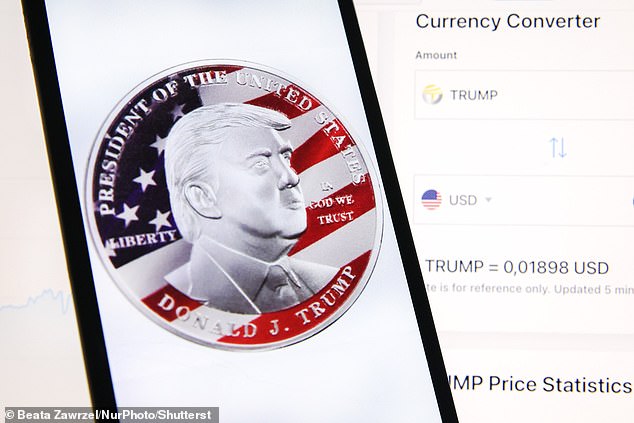The soaring value of Donald and Melania Trump’s crypto currency, in awe of the President’s second White House coming, is one of the more bizarre aspects of his impact on the world of finance.
It is no secret that Trump and his efficiency czar Elon Musk think that computer-generated currencies are the bee’s knees.
Trump wants the next boss of the Securities and Exchange Commission to be crypto friendly, erasing the stymied efforts of the last chairman Gary Gensler to restrict access.
That proved a hopeless enterprise with the value of bitcoin soaring another 4.2 per cent to $109,071 yesterday.
Despite the black marks against crypto – the mystery behind mining, the enormous energy requirement, dodgy exchanges, and the collapse of fraudster Sam Bankman-Fried’s FTX – it continues to soar.
Along the way, crypto enriches retail investors and hedge funds who never miss a get-rich-quick trading experience.

It also, as the US Justice Department has ruled, provides a haven for crooks and terror networks.
$TRUMP, launched by CIC Digital, a Trump Organisation company, takes the whole crypto scam to a new level.
Selling Trump-branded sneakers may be tawdry and plastering your name over hotels and golf courses egotistical and exploitative.
But for the leader of the free world to profit from power and global fame by developing his own currency raises ethical dilemmas.
A critical part of the president’s job is to preserve the dollar as a store of value and unit of exchange.
Trump is often described by supporters as ‘transactional’ because of his love of doing deals. $TRUMP and $MELANIA take matters to a whole new place with the President’s crypto valued at £12billion, far more than M&S, which has been around for 141 years.
Popular it may be, but Trump crypto blurs the line between the President’s government role and his efforts to enrich his already prosperous family from power.
What price then for £STARMER crypto? If gilt yields and the pound offer any clue, then there will be no great buying panic on the exchanges.
Disjointed mission
As a Chancellor banging the growth drum, Rachel Reeves faces an uphill task in Davos in the coming days.
The latest S&P UK Consumer confidence index shows it has plunged to its lowest level for a year as working people worry about jobs and pay growth amid £40billion of tax hikes.
Elsewhere, in an excoriating column in the Times, the director of the Institute for Fiscal Studies Paul Johnson rounds on Reeves and the Government for an intellectual muddle on growth.
The Government waffles on about securing fiscal credibility, unproved, its artificial intelligence (AI) initiatives and its reminder to regulators of their growth mission.
Yet a stonking rise in employers’ National Insurance contributions, refurbishing of worker rights, higher minimum wages, and preference for letting the Office for Budget Responsibility set the fiscal agenda, crowding out the private sector, works in the opposite direction.
Meanwhile, the Treasury committee, headed by Labour’s Meg Hillier, has essentially deemed that a new Office for Value for Money, one of the Government’s additional quangos, is a waste of space.
It is ‘poorly defined’ and clearly overlaps with other agencies such as the National Audit Office with 1,000 respected staff.
Mission-driven economics requires all oars of government to be rowing in the same direction. Reeves’s canoe is in a spin.
Shock therapy
The response of the Bank of England’s prudential regulation chief Sam Woods to the Government’s request to deliver on growth looks a little sniffy.
Before setting out his agenda, Woods reminds Keir Starmer and Rachel Reeves that financial instability can lead to ‘severe disruptions’ to the ability of households and businesses to manage risks, access credit and amplify shocks and hindering growth.
There follows a tame list of secondary pre-announced steps to support output, including the decision to slow tighter capital requirements for banks, to take the cap off City bonuses and to speed up approvals of City chieftains.
The great financial crisis (2008-9) and the impact of the Truss tantrum on pension funds hang heavy in the Bank’s memory.
DIY INVESTING PLATFORMS
Affiliate links: If you take out a product This is Money may earn a commission. These deals are chosen by our editorial team, as we think they are worth highlighting. This does not affect our editorial independence.

